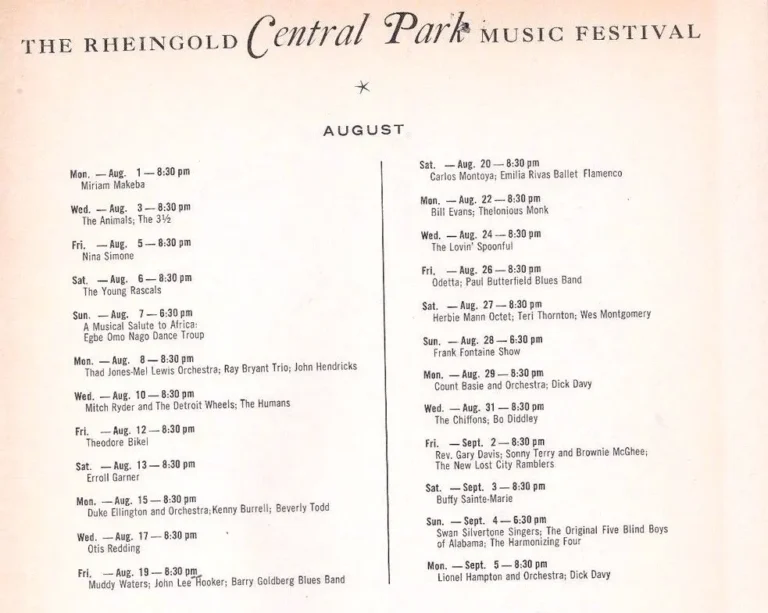Central Park has been home to some of the most iconic performances in musical history. In 1981, Simon & Garfunkel famously reunited for a free show that attracted half a million people. A concert featuring Garth Brooks, Billy Joel and Don McClean in the 90’s nearly doubled that size.

But before those iconic shows, the Schaefer Music Festival laid the groundwork for those to come.
The Schaefer festival was an annual summer concert series hosted between 1968-1976 at the Wollman Rink in Central Park. The series attracted some of the most notable names in music including Jimi Hendrix, Jerry Lee Lewis, The Beach Boys, Led Zeppelin, Frank Zappa and countless other show-stoppers.
A full list of performances through the years can be found here.

The rink seated between 4,000 to 8,000 people per show over the years. Tickets were sold for as little as $1 in the beginning and rose to $3 by 1976 (around $16 in today’s times). The relatively cheap tickets made the show accessible to the masses. The average concert ticket at the time was between $3-$10

Club owner and musician Hilly Kristal founded the series alongside famed producer and concert promoter Ron Delsener. The event actually started in 1976 as the Rheingold Central Park Music Festival before the sponsorship switched to The F. and M. Schaefer Brewing Company in 1968.

While I had never heard about the Schaefer Music Festival prior to researching this article, it turns out my aunt, Joan Giansante (a New Yorker of 50+ years) had actually attended a concert back in 1975, one year after she first moved to the Big City.
The concert in question featured Melissa Manchester and an up-and-coming Barry Manilow. The show date was September 12th, 1975.

“I just remember feeling like he was an incredible performer,” Giansante recalled of Manilow’s performance.
She added that at that point he didn’t have a large catalog of hits, but had some success writing jingles for television and radio commercials.
“He and the backup singers did a little medley where they sang a whole bunch of them. It was really fun,” Giansante said.

As opposed to the massive concerts that frequently flank Central Park’s grassy lawn, she remembers the Wollman Rink having a much more “intimate” atmosphere, which she enjoyed greatly.
For my aunt, who had just moved to the big city a year prior and recently made the decision to stay long term, she said that summer marked a turning point in her commitment to life in the Big Apple.
“Going to that concert was like ,’alright we’re residents here now.’ We’re not just passing through … we’re here and we’re gonna do stuff and make the most of it.”

Scrolling through online forums, the Schaefer festival appears to hold a soft spot in the hearts of many. Some users report seeing their first concert ever at the Wollman Rink. Many others recall sitting on big boulders outside the rink while listening to the concerts.
I interviewed Mike Bodayle, who remembers sitting outside with friends to hear a Dave Mason concert.
“We couldn’t see anything, but the sound was perfect. People were selling beers and we had a great time sitting on the rocks, listening to the music.”
As a college student, Bodayle saw 15 concerts at the Schaefer Music Festival over the years. His first concert at the Wollman Rink was seeing John Sebastian of The Lovin’ Spoonful back in 1973. He also got to see Peter Frampton, Hall & Oates and Bonnie Raitt, among others.

Another interesting tidbit that might be overlooked in this internet age: you had to go in person to buy your tickets ahead of time, or risk the show being sold out.
Bodayle fondly recalls the process on his own blog, Music City Mike,.
“Every year I waited for the schedule to be announced in either the Sunday New York Times or Village Voice. Tickets had to be bought in person with cash. For me this meant taking a trip on the Path train to the Korvette’s department store in Manhattan’s Penn Station on the day tickets went on sale.”

Bodayle even remembers skipping class to go to a few concerts.
“You had to get there pretty early. You would head in in the afternoon, try to find parking. It was all general admission seating and you had these long, winding, meandering lines to go in,” he told me. “[but once you were in the venue] it was a mad dash. If I can close my eyes, I can see people running when they got into the gate to get a place down front.”
The Schaefer festival continued until 1976, when Dr. Pepper took over as sponsor and renamed the event the ‘Dr. Pepper Central Park Music Festival’. In the early 80’s, the festival was moved to Pier 84 on the West Side after noise complaints from residents near Central Park. Then in ‘83, Miller Beer took over dubbing the festival the ‘Miller Time Concert on The Pier’ which lasted until 1988. Finally, in 1989 Reebok became the sponsor and renamed it Reebok Riverstage, which lasted through 1990.

Central Park continues to host massive concerts on the lawn as part of it’s SummerStage series. Of course, tickets are far from their $1 price tag of the 60’s.
The Wollman rink still sees the occasional concert, such as this DJ set by Stephan Bodzin in 2024
From all who talk about it, the Schaefer Music Festival had a special kind of magic that lives on in those who had the pleasure of experiencing it firsthand.


Comments are closed.